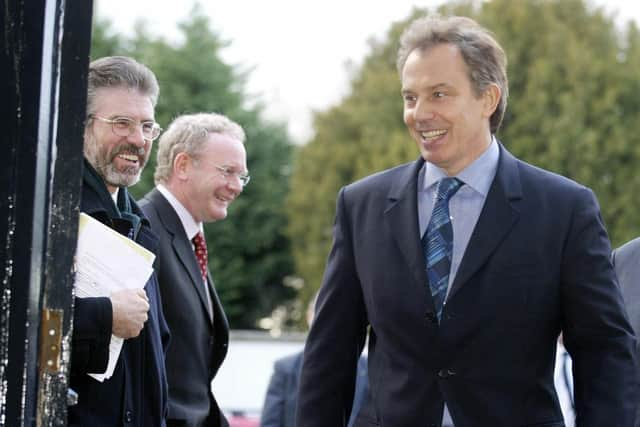The enormity of the Good Friday Agreement must not be forgotten - David Blunkett
It has always interested me how those who preach "peace" only remember Tony Blair for joining the US in invading Iraq five years later. You never hear people on the liberal left, or pundits and armchair Clever Dicks in the media, talking about the tremendous achievement of that spring, a quarter of a century ago.
It is true, as Tony Blair himself has always acknowledged, that John Major had taken the early steps in beginning the process of dialogue which led to negotiation.
Advertisement
Hide AdAdvertisement
Hide AdIn fact, an MI5 operation known as “Chiffon” had already laid the groundwork for the leadership of the armed wing of Sinn Fein, the IRA, to believe that a negotiated settlement would inevitably lead to a united Ireland.


No one could have predicted, then, that the UK-wide decision (but not in the North of Ireland) to leave the EU, would accelerate that process.
I have to remind myself that for anyone under about 45 years of age, this is all ancient history. My oldest son was just 21 at the time, and he had driven me to Norfolk where we were meeting up with friends for a rain-sodden Easter weekend. I phoned Tony Blair's Chief of Staff, Jonathan Powell, to say congratulations, only to find that I was one of just a handful of Ministers who had bothered to do so.
The one thing that links that rainy build-up to the signing ceremony in Belfast and the present day is the art of negotiation.
Advertisement
Hide AdAdvertisement
Hide AdJust over two weeks ago the House of Commons voted overwhelmingly (with only 29 against) for what has become known as the Windsor Framework.
This is the agreement with the European Union, which sets aside the Protocol negotiated by Boris Johnson as codicil to the Trade and Cooperation Agreement – which now stands a chance of succeeding.
The irony cannot be not lost on anyone that on the same day, Boris Johnson appeared in front of the Privileges Committee before taking himself off to vote against Rishi Sunak’s deal.
The enormity of what was achieved in 1998 cannot be compared, important as it is, with the current deal out of the impasse which was blighting businesses on both the mainland and Northern Ireland, and providing an excuse for the Democratic Unionist Party to refuse a return to power-sharing. As I write, they're still refusing to do so.
Advertisement
Hide AdAdvertisement
Hide AdWhen it comes to Ireland, the past continues to haunt us. My old tutor at university, Professor Sir Bernard Crick, did his best in the 1970s to facilitate a political solution, without success.
Many of his academic colleagues condemned him for getting his hands dirty in the real business of daily politics. But as Bernard wrote years before in his seminal work, In Defence of Politics, politics is a messy business, and so is negotiation.
If you want to make progress, you have to give a little to get a lot. But the challenge is to ensure that this generation, raised on instant communication, have something more substantial to draw down on than a diet of Kings and Queens and a history that too often teaches primogeniture rather than real politics.
Which brings me to the importance of history. It was, at least in part, a history teacher who inspired me to understand the vital role of politics in bringing about change and making a difference. An appreciation of the struggles of the past, and what people achieved by coming together and demanding a share in power and decision-making.
Advertisement
Hide AdAdvertisement
Hide AdIn other words, campaigning to spread democracy and, with it, some countervailing force against the overriding power of money, the military or a self-perpetuating elite.
So, when I read an article in a national journal suggesting that the percentage of youngsters taking GCSE history had fallen to 20 per cent, I decided to investigate.
The article made some incredibly good points about the fundamental role of history, and an understanding of how today's challenges can be traced back to decisions long ago. Cromwell in Ireland in the 17th century, through to that Good Friday Agreement, would be one example.
But here's the thing. The author of the article had got their facts wrong. Nearly 45 per cent of 15 and 16-year-olds take GCSE history. Not enough, but a substantial proportion, nevertheless. Another lesson in checking the truth and a recognition that had the author used the correct figure, I would still have enjoyed the article and understood the point being made.
Advertisement
Hide AdAdvertisement
Hide AdBringing history alive has other advantages. It can provide valuable role models for those outstanding characters for whom we owe so much, and the lessons we must learn and dangers we must avoid from the demagoguery of the Hitlers, Stalins and of Putin today.
Let us hope, in the years ahead, we can learn a little bit more from studying history.
Whilst we shouldn't live in the past, it has as much to teach us about avoiding the mistakes, and learning about the triumphs, of those who came before.
David Blunkett is a Labour Party politician, and served as the MP for Sheffield Brightside and Hillsborough.